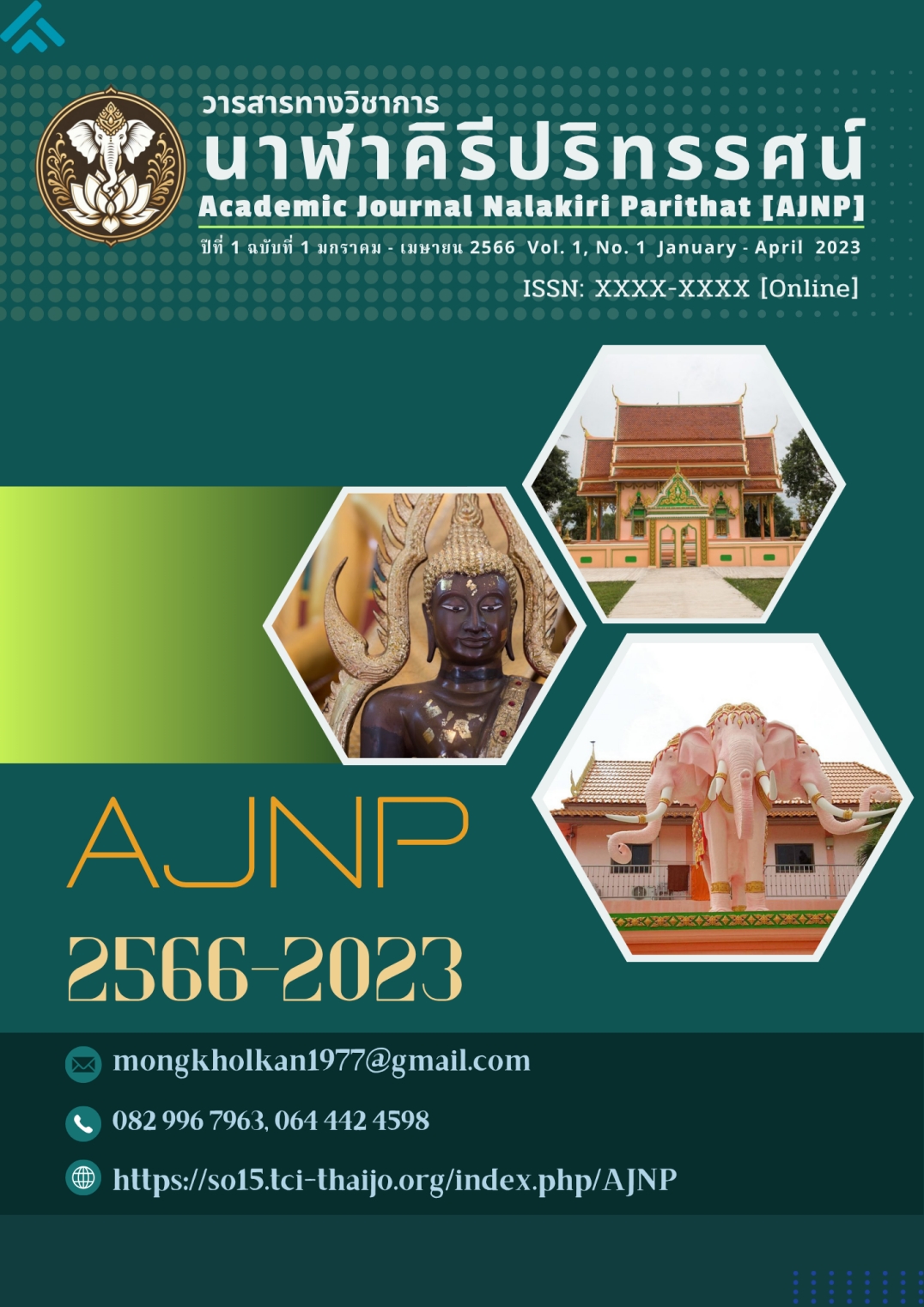Postmodern Philosophy Basics of Educational Philosophy
Keywords:
post modern, Basics of Philosophy, studyAbstract
Philosophy becomes meaningful only when it plays a role in society. By any means until society becomes aware and aware of the value of philosophy and applies philosophy to society as a compass and as a driving force for society to lead society to desired goals. Philosophy in this world includes both Eastern philosophy and Western philosophy. Both of these philosophies play a role in guiding society both in the past and in the present. By relying on those who dedicate their physical strength, intellect, love and determination. To establish wisdom for humanity.
Culture is something created by humans. Humanity's culture has existed in every era. Since ancient times People have a culture of living by hunting. There is a culture of choosing a partner. There is a culture in choosing where to live. Fighting for each other's place It is called a garage, someone's garage, someone's cave, a man's cave. Whoever has more power is the owner. In ancient times, society began to search for rules. Use rules for living together. Respect the rules more do not rely on force to make final decisions but adhere to rules. Everyone must consider whether it is against the rules or not. A good society is a society that adheres to rules. Medieval society was a society that relied on religious teachings to enter life and society. Adhere to religion as the main principle of life. The quality of society depends on sacrifice for society. Society is willing to sacrifice everything for permanent happiness in the next world, believing that Sacrifice for religion is the path to true happiness. Investing effort to build a temple Building a large and luxurious church is the best guarantee for the hereafter. As for the new society or modern society Humans have created a scientific culture to replace religious culture. Because it is seen that religious culture causes the growth of science to lag behind technology. It is necessary to rely on science as the science base only to make people truly happy. It is happiness that this life does not have to wait for the next life. Because happiness must be proven using scientific methods.
Society refers to the grouping of people based on beliefs. The bonds of tradition that tie people together into a single group. Post-Nova era refers to a viewpoint that opposes the Nava era idea that follows the concept of centrism, which is to believe in those in power without daring to think. Outside the box but after the modern era, we try to find new channels for people not to be stuck in the old mindset. Post-modern society It refers to a society that has moved away from fixed concepts. But ready to change yourself all the time. original frame of mind Refers to the modern perspective that follows the framework of science. Or take scientific rules as a refuge any time you deviate from the scientific framework is considered wrong. That is, not following the network and the network will not be acceptable. Modern society and post-modern society have different perspectives.
References
กีรติ บุญเจือ. (2522). ปรัชญาลัทธิอัตถิภาวนิยม. กรุงเทพฯ: ไทยวัฒนาพานิช.
กีรติ บุญเจือ. (2538). ปรัชญาสำหรับผู้เริ่มเรียน. พิมพ์ครั้งที่ 10. กรุงเทพฯ: ไทยวัฒนาพานิช.
กีรติ บุญเจือ. (2546). ชุดปรัชญาและศาสนาเซนต์จอห์น เล่มสี่ : ย้อนอ่านปรัชญานวยุคของมนุษยชาติ (ช่วงสร้างระบบเครือข่าย). กรุงเทพฯ: สำนักพิมพ์มหาวิทยาลัยเซนต์จอห์น.
ฉวีวรรณ คูหาภินันท์. (2534). วรรณกรรมทางมนุษยศาสตร์. กรุงเทพฯ: สำนักพิมพ์ศิลปาบรรณาคาร.
ชเอิญศรี อิศรางกูร ณ อยุธยา. (2529). ปรัชญาตะวันตกสมัยใหม่. กรุงเทพฯ: โรงพิมพ์มหาวิทยาลัยรามคำแหง.
ชัยวัฒน์ อัตพัฒน์, รศ. (2534). หลักพุทธศาสนา. กรุงเทพฯ: สำนักพิมพ์มหาวิทยาลัยรามคำแหง.
ชัยวัฒน์ อัตพัฒน์, รศ. (2530). จริยศาสตร์. กรุงเทพฯ: สำนักพิมพ์มหาวิทยาลัยรามคำแหง.
ฌอง ปอล ซาร์ต. (2540). ปรัชญาเอ็กซิลเทนเชียลิสม์ก็คือมนุษยนิยม. แปลโดย วิทยา เศรษฐวงศ์. กรุงเทพฯ: สำนักพิมพ์ธรรมชาติ.
ไดซากุ อิเคดะ. (2541). มนุษย์นิยมแนวใหม่. แปลโดย ฉัตรสุมาลย์ กบิลสิงห์ ษัฎเสน. กรุงเทพฯ: เรือนแก้วการพิมพ์.
เดือน คำดี, ดร. (236). ปรัชญาตะวันตกสมัยใหม่. กรุงเทพฯ: สำนักพิมพ์โอเดียนสโตร์.
ทรงวิทย์ แก้วศรี, บรรณาธิการ. (2532). มหาจุฬาฯวิชาการ: ปรัชญาบุรพทิศ. กรุงเทพฯ: มหาจุฬาลงกรณราชวิทยาลัย.
ทองหล่อ วงษ์ธรรมา. (2536). ปรัชญาตะวันออก. กรุงเทพฯ: สำนักพิมพ์โอเดียนสโตร์.
ทองหล่อ วงษ์ธรรมา. (2555). พื้นฐานปรัชญาการศึกษา: ภูมิปัญญาของตะวันออกและตะวันตก. กรุงเทพฯ: สำนักพิมพ์โอเดียนสโตร์.
นายแพทย์สุวัฒน์ จันทร์จำนง. (2540). ความเชื่อของมนุษย์ปรัชญาและศาสนา. กรุงเทพฯ: สำนักพิมพ์สุขภาพใจ.
นภาเดช กาญจนะ, ดร. (2541). ปรัชญาชีวิตยุค 2000 กรุงเทพฯ: สำนักพิมพ์สร้อยทอง.
พระทักษิณคณาธิกร. (2517). ปรัชญา. กรุงเทพฯ: อนุสรณ์งานฌานปนกิจศพนางวงษ์แสงประภา.
พระธรรมปิฎก (ป.อ.ยุตฺโต). (2535). พุทธศาสนากับการพัฒนามนุษย์. กรุงเทพฯ: บริษัทสหธรรมิก จำกัด.
พระธรรมโกศาจารย์ (ประยูร ธมฺมจิตฺโต). (2550). ปรัชญากรีก บ่อเกิดภูมิปัญญาตะวันตก. กรุงเทพฯ: สำนักพิมพ์ศยาม บริษัทเคล็ดไทย จำกัด.
พระธรรมโกศาจารย์ (ประยูร ธมฺมจิตฺโต). 2549). เปรียบเทียบแนวความคิดพุทธทาสกับซาร์ต. กรุงเทพฯ: อมรินทร์พรินติ้งกรุ๊ฟ.
พระมหาบุญเรือง ปญฺญาวชิโร (เจนทร). (2544). มนุษยนิยมในปรัชญาขงจื้อ. กรุงเทพฯ: โรงพิมพ์มหาจุฬาลงกรณราชวิทยาลัย.
ฟื้น ดอกบัว. (2544). ปวงปรัชญากรีก. พิมพ์ครั้งที่ 2. กรุงเทพฯ: สำนักพิมพ์ศยาม.
ราชบัณฑิตยสถาน. (2538). พจนานุกรมฉบับราชบัณฑิตยสถาน พ.ศ. 2525. พิมพ์ครั้งที่ 6. กรุงเทพฯ: บริษัทอักษรเจริญทัศน์.
ราชบัณฑิตยสถาน. (2540). พจนานุกรมศัพท์ปรัชญา อังกฤษ-ไทย. กรุงเทพฯ: อรุณการพิมพ์.
วิทย์ วิศทเวทย์. (2546). ปรัชญาทั่วไป. กรุงเทพฯ: อักษรเจริญทัศน์.
วิทยากร เชียงกูล. (2551). ปรัชญาการเมือง เศรษฐกิจ สังคม. พิมพ์ครั้งที่ 2. กรุงเทพฯ: สำนักพิมพ์สายธาร.
สถิต วงศ์สวรรค์, รองศาสตราจารย์. (2537). ปรัชญาตะวันออก. กรุงเทพฯ: สำนักพิมพ์รวมสาส์น.
สเถียร พันธรังสี. (2519). ศาสนาเปรียบเทียบ. กรุงเทพฯ: แพร่พิทยา.
เสถียร โพธินันทะ. (2522). เมธีตะวันออก. กรุงเทพฯ: ทวีพิมพ์ดี.
สนิท ศรีสำแดง, (2538). ความรู้เบื้องต้นเกี่ยวกับปรัชญาและศาสนา. กรุงเทพฯ: นีลนาราการพิมพ์.
ส. ศิวรักษ์ (นามแฝง). (2537). ศิลปะแห่งการเขียน. กรุงเทพฯ: ยูโรปาเพลส.
สุเมธ เมธาวิทยากุล, ผศ.ดร. (2535). ปรัชญาเบื้องต้น. พิมพ์ครั้งที่ 2. กรุงเทพฯ: สำนักพิมพ์ โอเดียนสโตร์.
สายพิณ ศุพุทธมงคล, ผู้แปล. (2539). โลกของโซฟี. (โยสไตน์ กอร์เดอร์ แต่ง). กรุงเทพฯ: สำนักพิมพ์คบไฟ.
สมภาร พรมทา. (2541). ชีวิตกับความขัดแย้ง. กรุงเทพฯ: สำนักพิมพ์จุฬาลงกรณ์มหาวิทยาลัย.
สมภาร พรมทา. (2538). พุทธศาสนากับปัญหาจริยศาสตร์: บทวิเคราะห์ปัญหาโสเภณี การทำแท้งและการุณยฆาต. กรุงเทพฯ: สำนักพิมพ์.
สมภาร พรมทา. (2543). มนุษย์กับศาสนา. กรุงเทพฯ: โครงการตำราคณะอักษรศาสตร์ จุฬาลงกรณ์มหาวิทยาลัย.
สมภาร พรมทา. (2545). มนุษย์กับการแสวงหาความจริงและความหมายของชีวิต. พิมพ์ครั้งที่ 2. กรุงเทพฯ: สำนักพิมพ์ศยาม.
สิทธิ์ บุตรอินทร์, ศาสตราจารย์, ดร. (2523). ปรัชญาการเมืองเบื้องต้น. กรุงเทพฯ: สำนักพิมพ์แพร่พิทยา.
สิทธิ์ บุตรอินทร์, ศาสตราจารย์, ดร. (2544). ปรัชญาเปรียบเทียบมนุษยนิยมตะวันออกตะวันตก. กรุงเทพฯ: สร้างสรรค์บุคส์จำกัด.
สิทธิ์ บุตรอินทร์, ศาสตราจารย์, ดร. (2532). มนุษยนิยม. กรุงเทพฯ: สำนักพิมพ์โอเดียนสโตร์.
สุจิตรา รณรื่น, รองศาสตราจารย์, ดร. (2540). ปรัชญาเบื้องต้น. พิมพ์ครั้งที่ 5. กรุงเทพฯ: บริษัทอักขราพิพัฒน์จำกัด.
สุวรรณา สถาอานันท์ และเนื่องน้อย บุณยเนตร. (2542). คำ : ร่องรอยความคิดความเชื่อไทย. พิมพ์ครั้งที่ 3. กรุงเทพฯ: สำนักพิมพ์แห่งจุฬาลงกรณ์มหาวิทยาลัย.
สุวรรณา สถาอานันท์. (2538). มนุษยทัศน์ในปรัชญาตะวันออก. กรุงเทพฯ: สำนักพิมพ์จุฬาลงกรณ์มหาวิทยาลัย.
สุนทร ณ รังสี. (2537). ปรัชญาอินเดีย : ประวัติและลัทธิ. กรุงเทพฯ: สำนักพิมพ์จุฬาลงกรณ์มหาวิทยาลัย.
อดิศักดิ์ ทองบุญ. (2540). คู่มืออภิปรัชญา. กรุงเทพฯ: ราชบัณฑิตยสถาน.
อดิศักดิ์ ทองบุญ. (2532). ปรัชญาอินเดีย. กรุงเทพฯ: บริษัทอัมรินทร์ พริ้นติ้ง กรุ๊ฟ จำกัด.
อดิศักดิ์ ทองบุญ. (2549). วิเคราะห์อภิปรัชญาในพระพุทธศาสนา. กรุงเทพฯ: ราชบัณฑิตยสถาน.
อมร โสภณรวิเชษฐวงศ์, ผู้ช่วยศาสตราจารย์. (2523). ปรัชญาเบื้องต้น. พิมพ์ครั้งที่ 3. กรุงเทพฯ: มหาวิทยาลัยรามคำแหง.
อนุมานราชธน, ศาสตราจารย์พระยา. (2531). ปรัชญาเบื้องต้น. กรุงเทพฯ: คณะอนุกรรมการจัดพิมพ์เนื่องในวาระครบรอบ 100 ปี พระยาอนุมานราชธน.
Downloads
Published
How to Cite
Issue
Section
License

This work is licensed under a Creative Commons Attribution-NonCommercial-NoDerivatives 4.0 International License.



